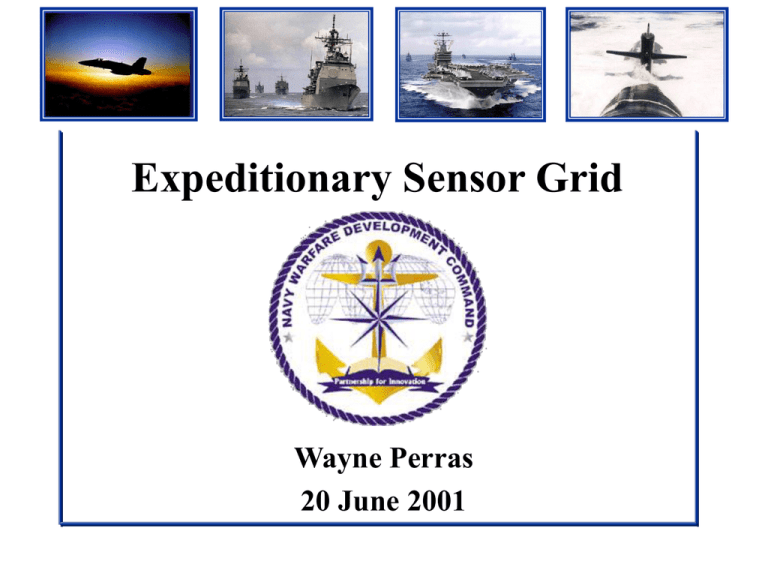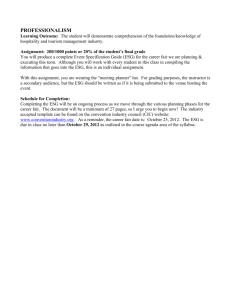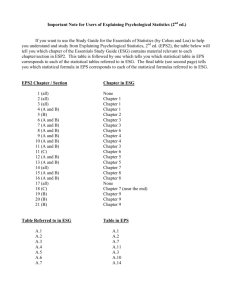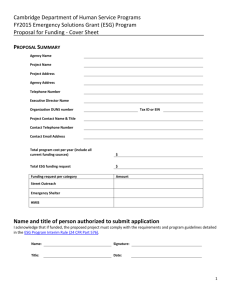*************~***H>**********I>******F>******O>**P>**Q>**R>**S
advertisement

Expeditionary Sensor Grid Wayne Perras 20 June 2001 Meeting Objectives • To describe the concept of Expeditionary Sensor Grid (ESG) and status of efforts. • To describe how Web Enabled Navy (WEN), Expeditionary C4 Grid (EC5G), and ESG are proceeding along a common path to achieving the vision of FORCEnet. • To agree on building a common terminology for the elements of FORCEnet. • To agree on building an experiment plan for WEN, EC5G, and ESG. FORCENET The Vision FORCEnet is the architecture that integrates sensors, networks, decision aids, weapons, warriors and supporting systems into a highly adaptive human-centric, comprehensive maritime system that operates from the sea bed to space and from sea to land. Expeditionary Sensor Grid New expeditionary sensors, processing, and the supporting networks that when combined with the emerging information infrastructure of our programmed forces (Joint, Coalition, and National) will provide the tactical and operational warfighters with the necessary situational awareness to maintain battlespace dominance while rapidly dismantling any potential adversary’s anti-access capabilities. Expeditionary Sensor Grid (ESG) Drivers Proliferation of Technologies & Systems 3rd & 4th Generation ASCMs Conceptual & Technological Opportunities Fast Patrol Boats Net Centric Op’s AIP-Equipped Sub’s Modern RSTA Advanced Ballistic Missiles Effects-based Op’s Modern Air Defenses Invasive Sensing with MEMS Adv Torpedoes & Mines Massively Distributed Info Systems SAP programs Unmanned Platforms CNS / CNA New IT technologies The Motivation We have a 5 - 10 year window of opportunity to improve… • Do We Retain Our Dominant Position ? Effective Combat Power Knowledge of where, when & how to maneuver & strike in order to (1) achieve battlespace dominance (2) dismantle anti-access defenses (3) achieve operational effects for decisive termination Access for maritime forces and the Joint Force • Durability to provide a tactically stable force ’91 ’00 ESG Contribution ’05 ’10 ’10 ’15 Blueprint For Post 2010 Naval Force Rapid Access & Info Superiority Force Blueprint For Post 2010 Naval Force Rapid Access & Info Superiority Force + Deterrence & Power Projection Force Blueprint For Post 2010 Naval Force Rapid Access & Info Superiority Force + Deterrence & Power Projection Force + Support Force ESG / FORCEnet FY01Thrusts • Operational Requirements – Information Needs – Existing Sensor Capabilities / Sensor Opportunities • Current Technical Solutions – Web Enabled Navy at the Tactical & Operational level of decision making – High-payoff/Low-risk technologies • Future Technical Solutions – Research in labs/industry – Understand opportunities and challenges DESIRED CAPABILITY • Continuous, real-time situational awareness of the littoral battlespace – – – – – Space Sea Air Land Information • Information to support operational and tactical level military actions in the littoral NWDC / ONI / OPNAV / SPAWAR / ONR Partnership: Analysis to Understand What Is ... Assess the Baseline Needed Crisis Peace Conventional Conflict Strategic Deterrence Prioritize Gaps & Opportunities • Strategy-to-Task and Functional Decomposition Analysis • Quantitative Forecast of Naval Combat Power “From the Sea” Tier 1 Tier 2 Derive CONOPs, CONOPs, Signatures & Needs Tier 3 Achievable Potential U.S.CONOPs Signatures Analysis Analysis Signatures (to Avoid, Deceive or Defeat) • Identify, track and kill long-range threat – – • IR and RF cue or identification Optional confirmation via imagery Signature Utility Garrison – Pervasive, deep-look tracker – Dynamic battle mgmt of “on-deck” wpn’s – – EW and cyber Geolocate Deploy Move Hide Stop / Surveill Configure Track / ID Fire (Rcv) Cue xxxxxxx DoS vs . network xxxxxxx Decoy & cyber-manipulation of passive elements to expose active radars & SAMs – Train xxxxxxx Degrade, manipulate & destroy ) ? ? xxxxxxx ? ? ? ? ? ? ? ? ? ? ? ? ? ? ? ? ? ? , image & attack VHF radars xxxxxxx • Deter launch and negate in-flight – Develop & Execute ESG Evolution Strategy ? xxxxxxx On-board designation of launch xxxxxxx personnel + attack by companion aircraft • – DIRCM, HPM or ASAM – Identify and avoid hot zones vs . SAM xxxxxxx ? Low / No Potential future responses – Degrade surveillance & guidance – Self-protection using DEW and HPM – See missile defense + Capability 2010 2015 Joint / National / Allied (“Free” to DoN) Joint / National • Open sources • Commercial imagery • FIA+, ASA+, ... • • • • • 2020 Mission Effectiveness • RJ and GH JASF • CNS / CNA • Non-coop. XMT / IO • • • Programmed DoN Mod’ed Pgm’s • Ship active sonar • ASW helo • • • Evaluate Cost & Effectiveness Affordable High Utility (? Indicates Uncertain Availability) • Quantity • Quality • Timeliness Develop Integrated Solution Options Deployment Packages 2005 Good Key Information Needs Type of Information 2000 Useful, but Insuff . (as above) counter-measure terminal seekers Potential Off-board Options Distributed • MGH Radar … or EO/IR … or MSI/LADAR … and JSAF … and ESM … and EW • ESM on UCAVs and UAVs • • • • • • Potential On-board Options Organic to Platforms • Optical … or mm-wave terminal BMD sensor • Enhanced Aegis Radar ... or ship-based GBR … or GBR • SHF Radar Payload on E-2C … or EP-3E ( prolif. HB) • Sea Lance deception pkg’s • • • Life-cycle Cost Possible Executive Summary Identified Viable Concepts to Meet Challenges Threat and Defense Strategy Demand Info Superiority 2000 • Maritime Global Hawk Radar • CM Barrier • Seabot In-Port Protection • Deploy and integrate classified • Classified • Integration foundation for advanced rapid tasking, correlation & fusion • Advanced comm’s grid • Concept Development and R&D • • • • • • • • Space-Based Radar Classified Classified Massive Sensor Fields Analysis Cell vs. Red RSTA Classified Adv. Tasking & Correlation Concept Development and R&D • Sophisticated fusion of multiple, massively distributed sensor networks • Adv. analysis and modeling techniques + classified vs. adversary C2/BM and leadership • Rapid, Decisive OMFTS/STOM - Counter Static Mines - Counter Low-Altitude Air Defenses - Unconventional Forces in Urban & Foliated • Sophisticated Understanding of Enemy Values, COAs, and Plans • Counter More Advanced Threats - Precision Ballistic Missiles - Mobile Mines - Wake-homing Torpedoes • Maintain US Offensive Dominance - Rapid JSEAD • Counter ASCMs & Adv. SAMs - Robust Strike vs. Difficult Targets • Counter Terrorism - Pervasive Sea Control • Enhance Strike, Info Op’s/ EW & Effects-Based Op’s 2005 2010 2015 2020 Top-Level Mission-Oriented Architecture (For integration with Mission Capability Packages) Missions ESG Elements AAW BMD ASW MIW ASuW JSEAD Strike CV/CG/DD SSN TACAIR Strike Missiles CV/CG/DD SSN TACAIR Strike Missiles NFS Amphib & JVAA Spec. Ops Counter Terror. Mng. TTW SSN / Boat Helo DD / LHA CV/CG/DD LPD/LHA USMC Co. All Classified Classified Classified Classified Classified Classified Classified Classified Classified Classified Classified Key Forces CV/CG/DD SSN CV/CG/DD USMC Div CV/CG/DD TACAIR TACAIR AntiSAM / ABM torpedo SOF DD LPD/LHA Strike Missiles LPD/LHA AAAV MV-22 / Helo TACAIR Underlying Network is Essential Software & Legacy Radios (JTRS, JTIDS/MIDS, TADILs, …) Space Based IP Regional Airborne Relays (ACR, E-2C & Airborne C3/BM) Local / Regional Acoustic Net Networ k Federal Gov’t + Commercial Convergence Conver gence Extra-Regional ESG Sources Processing Analysis Dissemination Mgmt Deep Littoral (BLOS) Regional Maritime Submerged ESG Sources ESG Sources Processing Analysis Dissemination Mgmt ESG Sources A fully connected, “virtual mesh” with universal accessibility at the network layer Layer ESG / FORCEnet FY01 Thrusts • Operational Requirements – Information Needs – Existing Sensor Capabilities / Sensor Opportunities • Current Technical Solutions – Web Enabled Navy at the Tactical & Operational level of decision making – High-payoff/Low-risk technologies • Future Technical Solutions – Research in labs/industry – Understand opportunities and challenges The Prototype CoABS Grid a FY01 First Down Master Battle Planner Theater Picture Plans/ATOs Theater Picture Grid Service Helper Grid Service Helper Discover, Join, Lookup CAMPS TBMCS Grid Service Helper Coalition Partners Grid Service Helper Search CoABS Grid Core Services Grid Service Helper Sensor Data Logging Admin Visualization Events Grid Service Helper GCCS-M Target List Tactical Picture Search Subscribe Instrumentation Search Publish Security Publish Subscribe Register Capabilities Grid Service Helper Tactical Picture GCCS-A BOTTOM LINE: Prototype CoABS Grid allows heterogeneous agent and legacy systems to: Register themselves Advertise their capabilities & needs Find available resources Communicate among themselves Form task-based teams Encrypt conversations ESG Experimentation Roadmap JINI/CoABS/P2P Web-Enabled Navy FY01 P2P/Sensors/Agent Based Computing Heterogeneous Integrated Network (FY01-02) XML/RDF/DAML Sensors Expeditionary Sensor Grid (FY03…) Semantic Web (FY02-03) ESG Execution FY01-02` Coevolve Technology and Operations IA Tools JBI DARPA DARPA Sensors/Systems CoABS Grid FCS IMMACCS ESG Baseline NWDC ESG+ DARPA Lab Operational Experimentation ONR Partnership Labs FY02/03 FBE-J LOEs Wargames MC02 FBEs/Wargames Lab Operator ESG / FORCEnet FY01 Thrusts • Operational Requirements – Information Needs – Existing Sensor Capabilities / Sensor Opportunities • Current Technical Solutions – Web Enabled Navy at the Tactical & Operational level of decision making – High-payoff/Low-risk technologies • Future Technical Imperatives – Research in labs/industry – Understand opportunities and challenges FY 02+: A Reach…but Very Important to Get Started Now • • • • • • • • • • • • Coalition Operations (CoAX) DARPA Agent markup Language (DAML) Smaller and more capable sensors of all types Dynamic Data Base (DDB) Dynamic Tactical Targeting (DTT) Fusion Future Combat System Information Assurance Information Operations Additional Agents (as they mature) Fault-tolerant tactical Networks Plug-and-Play coalition environment ESG / FORCEnet FY 01/02 Thrusts • • • Operational Requirements – Information Needs – Existing Sensor Capabilities / Sensor Opportunities Operational Experimentation – Realistic Fleet Prototype Environment – Evaluate High-payoff/Low-risk technologies Analytical Studies – Leverage research in labs/industry – Understand opportunities and challenges • Develop Roadmaps (Fleet, SSG, N6C, N70, N81, N091, ONR, SYSCOMS) – Legacy System Paths – New Technology Paths – Develop and Maintain Rule Book TF Architectural Framework Business and Operations IT21 Marine Corps Tactical Network Navy Marine Corps Intranet Industry Partners Extranet Navy Research Learning Network Network “.edu” Defense Information Replicated Data Bases Per Mission Requirements System Network (DISN)/ Global Information Grid (GIG) SYSCOM Training Center Pier Connections HQ Clinic Fleet & USMC Deployed Forces TELEPORT Network Operations Center (DISN Interface) Authoritative Data Sources Consolidated Data Bases Common Access Afloat and AShore Expeditionary C5 Grid (EC5G) The Vision • The Automated Network Infrastructure for FORCEnet • Builds on today’s IT-21 afloat and ashore infrastructure • Goal is a force level capability fielded by FY-06 (IT-21 Blk 3). Expeditionary Sensor Grid Time Deployed Sensor Coverage Numbers Characteristics When Committed Cost Real Time Network High Interest Areas Stability Many (100’s – 1,000’s) Low Fully Netted Endurance – Hours to Months Limited Vulnerability Counters CCD Expeditionary Framework WEN + EC4G + ESG Navy Marine Corps Intranet Industry Partners Extranet ESG/EC5G Navy Research Learning Network Network “.edu” Defense Information System Network (DISN)/ Global Information Grid (GIG) SYSCOM Training Center HQ TELEPORT Pier Connections Network Operations Center Clinic (DISN Interface) Technology Development Roadmap ShortTerm MiddleTerm LongTerm NetworkCentric Legacy Integration Application Program Interface Data ClientInterchange/ Server Metadata (IDL, XML) C / CORBA WebEnabled Warfare ServiceBased Middleware Web-Service Description Languages (WSDL) Peer-to-Peer (P2P) JAVA / JINI FORCEnet / Joint Battlespace Infosphere Agent-Based Semantic computing Web Languages FullyDistributed Peer-to-Peer (not yet known) WEN Technology Development Roadmap ShortTerm MiddleTerm LongTerm NetworkCentric Legacy Integration Application Program Interface Data ClientInterchange/ Server Metadata (IDL, XML) C / CORBA WebEnabled Warfare ServiceBased Middleware Web-Service Description Languages (WSDL) Peer-to-Peer (P2P) JAVA / JINI FORCEnet / Joint Battlespace Infosphere Agent-Based Semantic computing Web Languages FullyDistributed Peer-to-Peer (not yet known) EC4G Technology Development Roadmap ShortTerm MiddleTerm LongTerm NetworkCentric Legacy Integration Application Program Interface Data ClientInterchange/ Server Metadata (IDL, XML) C / CORBA WebEnabled Warfare ServiceBased Middleware Jini Web-Service Description Languages (WSDL) Peer-to-Peer (P2P) JAVA / JINI FORCEnet / Joint Battlespace Infosphere Agent-Based Semantic computing Web Languages FullyDistributed Peer-to-Peer (not yet known) ESG Technology Development Roadmap ShortTerm MiddleTerm LongTerm NetworkCentric Legacy Integration Application Program Interface Data ClientInterchange/ Server Metadata (IDL, XML) C / CORBA WebEnabled Warfare ServiceBased Middleware CoABS Web-Service Description Languages (WSDL) Peer-to-Peer (P2P) JAVA / JINI FORCEnet / Joint Battlespace Infosphere Agent-Based Semantic computing Web Languages FullyDistributed Peer-to-Peer (not yet known) The Semantic Web Layers Trust Rules Self Desc. Data Struc. Data Logic Ontology Vocabulary Digital Signature Check and Deduc. Proof ESG RDF +rdfschema XML+NS+xmlschema TFWeb UNICODE URI JBI Emerging Technology Investments Commercial Tech: DoD S&T: • E-commerce Solutions • Information Assurance & Survivability JBI-2 • Web Technology: XML, XSL, XQL JBI-1 • Advanced Data/Sensor Fusion • Enterprise YJBI-1 Application Integration (EAI) Middleware • Intelligent Agents • Distributed Storage, Indexing, & Retrieval • Digital Libraries • Auto Data Capture & Info Extraction • Data Warehousing • Immersive Virtual Environments 2001 Today 2005 2010 Near-Term Long-Term • Warfighter Connectivity LEVERAGE E-BUSINESS SOLUTIONS WITH ROBUST DOD S&T INVESTMENTS Decision • Common Terminology for elements of FORCEnet – NWDC will take lead in developing terminology with support from N6 and N09W – NWDC will coordinate with SSG • Experiment Plan for ESG, EC5G & WEN – NWDC will take lead in coordinating plan for integrated laboratory, limited objective, and Fleet Battle experiments with support from N6 and N09W




